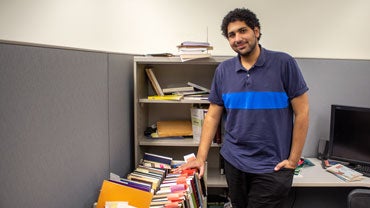
If you’ve used the Library, you have seen the impact that student workers have. More than 100 Georgetown students work in all departments of the Library, helping to check out materials, ensuring books are promptly returned to the shelves, working with special collections, and much more.
Ali Tohamy (G ‘24) is one of those student workers. A student in the Master of Arts in Arab Studies program, he has been working at Lauinger Library as a Middle East Library Assistant since December 2022. This position was funded by a Title VI grant awarded to the Center for Contemporary Arab Studies (CCAS). Ali works with Georgetown’s Middle East Studies Librarian Ryan Zohar to process new Arabic acquisitions, including both overseas purchases and gift books. In this interview, we asked Ali about his position, how it relates to his research and coursework at Georgetown, and what he would like the greater Georgetown community to know about Lauinger Library and its collections.
Georgetown University Library: Could you tell us a bit about the work you are doing with Lauinger Library's Middle East collections?
Ali Tohamy: I primarily work on processing and cataloging new Arabic books. For donated Arabic books, I am involved in assessing the quality and relevance of the materials, and based on that assessment we make the decision to add the books to the collection or not. A lot of books still need to undergo processing and cataloging and there is still lots of other work to be done!
GUL: What connections do you see between your work at the Library and your studies at the CCAS? Would you say that your work has influenced your research or changed the way that you view sources in Middle East scholarship?
AT: That's an interesting question. We talk a lot about cultural production in our classes. Working with the Library gave me access to a new dimension of this subject. I am not only focused on the content of cultural production, but also place an added emphasis on the publication itself. You can learn a lot about a book just by looking at where and when it was published. With Arabic books, there are very clear developments: Older books tend to be more focused on nationalist or Arabist ideas, but starting in the 1980s we see an increased output of religious books. There are also interesting aspects about the publishers and their locations. As expected, Cairo and Beirut publish more books, and that is a testament to their influence as centers of cultural production in the region, but we can find some recent changes. Kuwait City publishers are becoming more noticeable contributors and—while Cairo and Beirut still maintain their position—there is also more diversity when it comes to the publishing houses. I could write a whole thesis about this topic, but these are the main points.
GUL: What are some of the more interesting items you've been able to work with at the Library?
AT: There are a few first-edition books that I've worked with, a couple of them being Taha Hussein books dating back to the 1930s and 1940s. But there is also an Arabian-American Oil Company (ARAMCO) item that was very interesting. It was a compilation of short stories from a journal from the early days of the company, and they are about anything but oil!!
GUL: Working on the acquisitions and technical services-related tasks at the Library, you have a unique perspective on the research and publishing worlds that not everyone gets to see every day. Are there things you've learned from your work that you'd like to convey to colleagues and peers at Georgetown and beyond?
AT: There are a lot of lessons that I’ve learned. The outstanding one is related to the way that the Library’s collection is curated. Libraries as institutions can come off as intimidating and mysterious, but they are just led by very passionate people who are interested in supporting different scholarly and academic interests. There is a much more personal side behind the bibliographic records. There is a lot of human input that goes into shaping the collections.
GUL: What are your hopes when it comes to future collaborations between the Library and students and scholars of the Middle East at Georgetown?
AT: I’d like there to be more awareness about what the library has to offer, but I am also hoping for there to be more input from the student body taken into consideration when building the collection or offering library services. I graduate next spring, but Middle East Librarian Ryan Zohar is very easy to reach and is always interested in hearing suggestions and ideas from students.
